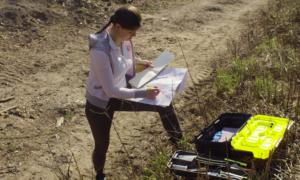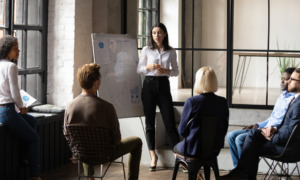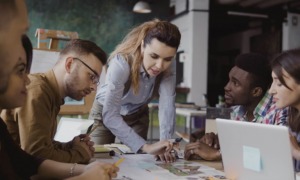By Melissa Etehad, 17
L.A. Youth, Los Angeles
One day, while watching TV, I came across a channel that showed a half-naked child standing in the middle of a desolate dirt road, holding a broken toy covered with mud. A narrator explained that this was sub-Saharan Africa, in a village with no food, running water, or access to education.
I couldn’t forget the image of the child. I started researching global poverty on the Internet, and what I found shocked me. According to Bread for the World, an organization that fights world hunger, 923 million people across the world are hungry. Every day 16,000 children die from hunger – that’s one child every five seconds. And some 1.1 billion people in developing countries have inadequate access to water. After I learned this, I felt guilty each time I ate a meal, went to the grocery store or saw people throw away food.
The more I kept researching and learning, the more I felt I needed to act. At first I thought that it would be easy to find ways to fight global poverty. However, I realized it would take more than just wanting to do something.
Not doing anything felt painful but I didn’t know where to put my attention. So in 10th grade I started a club at school called On the Move for the Globe, dedicated to helping people in poverty in Third World countries. But I still didn’t know specifically how to do that.
That same year I joined student council and met Kelly Snyder, who was two years older than I. Kelly’s passion was fighting global poverty. Through the nonprofit Invisible Children, she had raised $25,000 to build a school in Uganda. “How is it possible to raise that much money?” I thought.
Kelly took me under her wing. She used to always say, “It doesn’t matter how the event turns out, what matters is that you did it.” I realized that it’s more important to take action than to just sit around and wait for a perfect idea. She showed me how to put on school events, how to lead meetings, and how to deal with money and the school administration. I learned so much from Kelly. She always talked with enthusiasm and confidence, and helped me realize that fighting global poverty was possible for a teen.
Through Kelly, I found out about organizations like Amnesty International, Habitat for Humanity, Global Citizen Corps, and the ONE Campaign. All of these organizations have suggestions for how teens can get involved, and I began to understand that raising awareness is one of the most important ways that I could make a difference.
At the beginning of junior year, my club held its first event for World Food Day. We went from classroom to classroom talking to people about the facts of hunger in Africa. A few months later, I decided I wanted to do something for World AIDS Day. I spoke at an assembly before 350 students, to build awareness about AIDS in Africa.
At the end of junior year I applied and was accepted to the Global Citizen Corps Leadership Summit in New York, which brought together students of all ethnic backgrounds from across the country. I was excited because I would be able to meet a group of teenagers who felt the same way I did. Throughout the week I met people who spent their lives trying to end global poverty. We listened to speakers who worked on the problem of HIV/AIDS in Africa. There was a man whose sister died of AIDS in Uganda and a man who started an organization to end world hunger. We also visited the United Nations.
On the last day of the summit we were asked to stand up if we had ever felt stuck, hopeless, or anxious in our efforts to fight poverty. Before I knew it, everyone in the room was standing, acknowledging the same fears I had. One girl talked about how she had a hard time having events at her school because her administration was too strict. Another girl said she felt frustrated because she didn’t know how to motivate people at her school to care about global poverty. I was relieved to hear that I wasn’t the only person who struggled and felt this way. Listening to everyone made me realize that how we act when we come across difficulties is more important than what those difficulties might be.
After I came back from the summit I felt that I had a clear vision of my priorities. I really wanted to encourage people at my school to become involved.
I organized a group of four students to spend a day working with Habitat for Humanity, helping to construct a home for a family. Fixing up a house for someone is a great way to fight poverty.
We painted for eight hours, and by the end of the day everyone was exhausted. The woman who owned the house gave us all hugs. I organized two more Saturday trips to work on the house.
I know that some day my dream of going to Africa and working directly with people in poverty will come true. Until then, I plan on continuing to educate my community and involving other teens in helping families in need.
© 2009 L.A. Youth, http://www.layouth.com.































